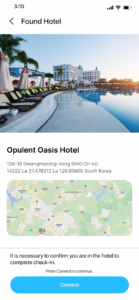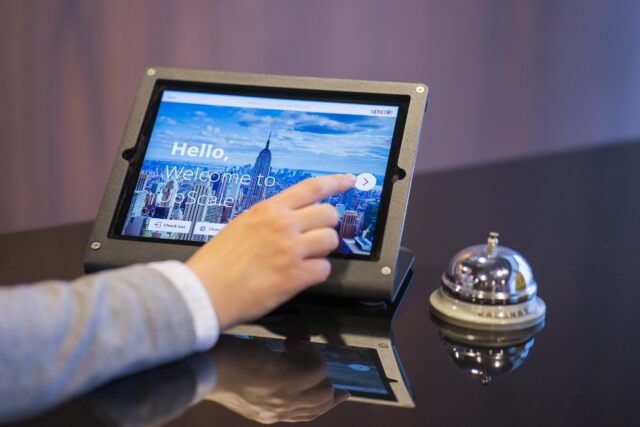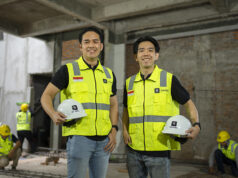Travel has picked up across Asia over the past year. Thailand’s beaches are full of people, tourists from around the globe have returned to Seoul and airports from Jakarta to Beijing are bustling with business travelers once more. That is good news for hotel guests and operators.
However, there is also some bad news. Many properties are struggling to attract and retain staff as tourism picks up throughout the region. Current travel tech focuses on providing services from the customer’s point of view but that means hotel operators require more experienced employees to fill in areas where gaps remain.
“It is very difficult to hire and retain skilled employees due to rising labor costs and prices due to inflation and the pandemic. In this situation, it is expected that it will become increasingly difficult to maintain revenue generation due to the nature of the hotel industry without inducing or maximizing services in a way that minimizes tasks for employees,” Dong Shik (James) Kim, MyCONECT CEO, says. “In order to overcome these difficulties, it is necessary to simplify and minimize staff tasks by offering self-service options and using technology to automate certain services that can be automated.”
That is what makes property management systems (PMS) so important these days. These platforms have already allowed for the digitization of specific processes, such as checking in and out of a hotel. Still, James believes there is potential for the technology to do more. And operators unable to tap into this face a myriad of challenges.
“In order to meet the guests’ needs for customized and exceptional service, guest engagement tech services and an evolved PMS that can complement and satisfy these needs are indispensable components,” James states. “If this is overlooked, the hotel may encounter difficulty in operations due to a decrease in room occupancy rates caused by a lack of customer satisfaction, which is caused by poor staff operations as a result of a heavy workload, human error, losing competent employees due to dissatisfaction of work environment, etc.”
Related: Meet the startup some call Indonesia’s Airbnb
MyCONECT: A better type of travel tech

MyCONECT felt existing travel tech came up short in meeting the needs of both guests and hotel operators. The PMS, which recently launched its second version, was built by those who had been providing and consulting hotel operation solutions for more than 30 years. That is extremely important to note.
This isn’t a tech startup trying to solve hospitality challenges. MyCONECT is an experienced hospitality firm developing technology to eliminate guest pain points while allowing hotel staff to work more efficiently.
“What makes MyCONECT different from other solutions is that it was developed with what causes guest dissatisfaction and complaints along with what hotel staff want and need which we have gathered over the 30 years of consulting in mind,” James explains. “We plan to have a differentiated approach by allowing guests to use the platform for a convenient hotel stay and employees to provide cognitive service to their guests.”
That last part is one that gets overlooked by current PMS platforms. MyCONECT provides a 100 percent contactless and touchless solution starting from hotel booking, valet parking and check-in to service requests during a stay all the way through to checkout. When something is needed, hotel staff will be better equipped to address it. The end result is a reduction in operating costs along with maximized operational efficiency through complete automation. But this is only a start.
“We plan to have a differentiated approach by allowing guests to use the platform for a convenient hotel stay and employees to provide cognitive service to their guests. In addition, rather than all elements being developed and provided by MyCONECT, we intend to develop a win-win business model by incorporating various service providers in different regions for specific services to the platform,” James notes.
That could eliminate one of the most common complaints among travelers; being required to download different apps for different hotels or, worse, being required to have multiple apps for different services at the same hotel. MyCONECT was built to ensure that wasn’t an issue.
“MyCONECT provides only the basic core services, and the rest are designed to be plugged and played according to hotel needs and what it wants to offer to its guests,” James says. “Also, with a one-time single download of the MyCONECT app, it can be used at any MyCONECT partnering accommodation facility. Depending on the types of services the hotel chooses and wants to offer to its guests, it can be implemented on the MyCONECT app.”
Also Interesting: What is the new Thailand tourism fee (and why it’s not a big deal)?
An exciting future for travel tech

According to James, travel tech could undergo some massive shifts in the not too distant future as AI and machine learning unlock more robust solutions for guests and hotel operators.
“I believe that the future of travel tech will bring about another technological change in the travel industry offering solutions that are equipped with AI and ML,” James proclaims. “Due to such evolved travel tech, consumers will experience services they have never experienced before, and such services are expected to bring about changes in the current leading business patterns.”
In the short term, he believes PMS will explore more one-to-one marketing that is tailored to guests’ preferences. The goal is for anyone who stays at a property to have a personalized experience with as little contact as possible. Looking long term, travel tech could change everything, including how hotels use their space.
“The front desk and lobby occupy the most amount of space in today’s existing hotels. However, these spaces are expected to be used to offer different services due to self-service options and automation of services enabled by travel tech,” James details.
He concluded, “For instance, it could be transformed into an exhibition space for artwork like a gallery, or a socializing or meeting area for hotel visitors and guests. Also, it is expected that travel products and services will be generalized through the metaverse. Service providers that will lead this type of new paradigm shift are expected to be new emerging tech providers rather than existing ones.”
To learn more about MyCONECT, please click here.


































